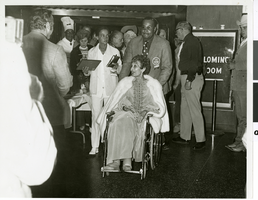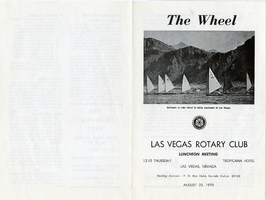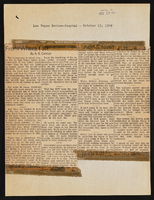Search the Special Collections and Archives Portal
Search Results

Photograph of Judy Bayley at a public event at the Hacienda Hotel and Casino, Las Vegas, Nevada, 1971
Date
Archival Collection
Description
Image

Transcript of interview with Stephen Nasser by Barbara Tabach, January 17, 2018
Date
Archival Collection
Description
At the age of thirteen, the incredible life journey of Stephen “Pista” Nasser (b. 1931 - ) is preserved in his heart. His ordeal begins when his family are ripped from their home to be interred in a Nazi concentration camp in 1944. Fifty years later, he sits in his Las Vegas home and reflects on his calling to write and speak about his survival and losses. His ordeal is preserved in his book My Brother’s Voice (2013) and in his follow up stage production Not Now Pista. He is also the author of a companion memoir, Journey to Freedom. Stephen and his wife Francoise are tireless in their travels throughout the United States and the world. At the time of this 2018 oral history interview, Stephen had done over 1092 presentations about his harrowing life story to thousands of people of all ages and denominations. Each presentation fills a spot in his heart as he honors his brother and reminds listeners that such devastating episode in history should not be forgotten, and should never occur again. The timing of this interview also coincided with the premiere of a 20-minute documentary based on his writings and the play production. It was shown at the 2018 Las Vegas Jewish Film Festival. Note: the photo above of Stephen and Francoise Nasser was taken shortly after this interview on their next cruise. (2018)
Text

The Wheel Las Vegas Rotary Club newsletter, August 20, 1970
Date
Archival Collection
Description
Text

Mei Yang oral history interview: transcript
Date
Archival Collection
Description
Oral history interview with Mei Yang conducted by Jourdin Wilson on November 10, 2021 for Reflections: The Las Vegas Asian American and Pacific Islander Oral History Project. University of Nevada, Las Vegas (UNLV) professor and graduate coordinator Mei Yang talks about her family and childhood in Shanxi Province, southwestern China. She shares her educational background pursuing her bachelor's and master's degrees in China before immigrating to the United States to earn her PhD in Computer Science from the University of Texas, Dallas. Mei Yang talks about her move to Las Vegas, Nevada, her work and professorship at UNLV, and her thoughts on pursuing a STEM (science technology engineering math) career as a woman. She shares how she raises her daughters in the United States away from her husband overseas, the Chinese community within Las Vegas, and traditions she celebrates.
Text
Jane Greenspun Gale oral history interview
Identifier
Abstract
Oral history interview with Jane Greenspun Gale conducted by Barbara Tabach on January 31, 2018 and February 09, 2018 for the Southern Nevada Jewish Heritage Project. Gale recalls attending Las Vegas High School, desegregation of schools, and what is was like growing up in Las Vegas, Nevada in the 1960s. Gale then recalls the anti-war position taken by the
Archival Collection
Bernadine Brunson oral history interview
Identifier
Abstract
Oral history interview with Bernadine Brunson conducted by Aaron Louis Koshan on March 02, 2006 for the Public School Principalship Oral History Project. In this interview, Dr. Brunson reflects upon her 33-year career within the Michigan public school system as a teacher and administrator. She describes how following retirement in Michigan, she decided to move to Las Vegas, Nevada. Upon moving to Las Vegas, she became a principal with the Clark County School District, and also taught at the University of Nevada, Las Vegas (UNLV). She discusses the differences between public school systems in Michigan and Nevada, and what she believes are the strengths and weaknesses of both.
Archival Collection
June Eshelman oral history interview
Identifier
Abstract
Oral history interview with June Eshelman conducted by Elizabeth Goodman on March 14, 2003 for the Public School Principalship Oral History Project. In this interview, Eshelman reflects upon her nearly 30-year career as a junior high school music teacher and administrator with the Clark County School District (CCSD) from the 1970s to the early 2000s. She discusses her early experiences as a music teacher and band director, and describes the challenges of transitioning from a teacher to a dean, and eventually principal. She also discusses her experience as a principal working at Gilbert Magnet School, and the different expectations that principals face when working with magnet programs.
Archival Collection
Judy K. Cameron oral history interview
Identifier
Abstract
Oral history interview with Judy K. Cameron conducted by Evan Polili on April 19, 2004 for the Public School Principalship Oral History Project. In this interview, Cameron reflects upon her 30-year career as a teacher and administrator with the Clark County School District (CCSD) from the 1960s to the 1990s. She describes her regular job duties, challenges she faced, and training experiences that she feels were the most beneficial to her career. She also describes her experience as an assistant principal at Bonanza High School, and how the experience prepared her for principalship. She also offers her opinions of the contemporary standing of CCSD, and challenges from overcrowded classrooms.
Archival Collection


